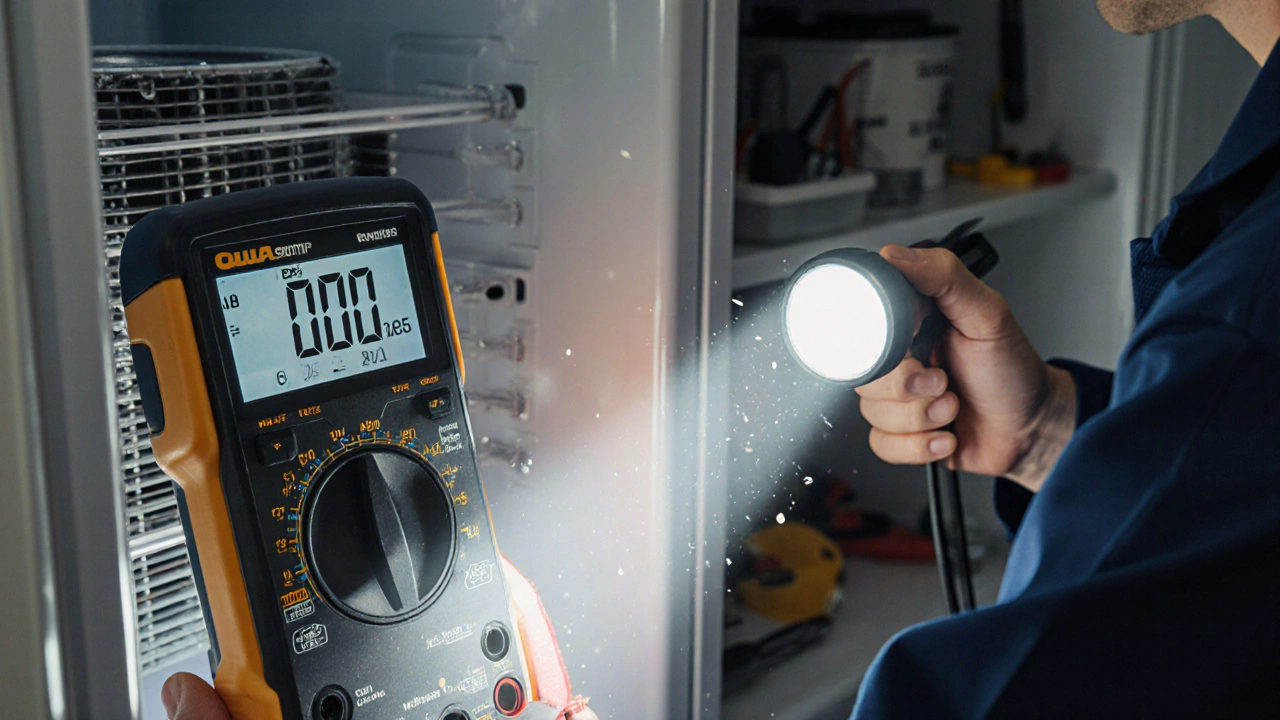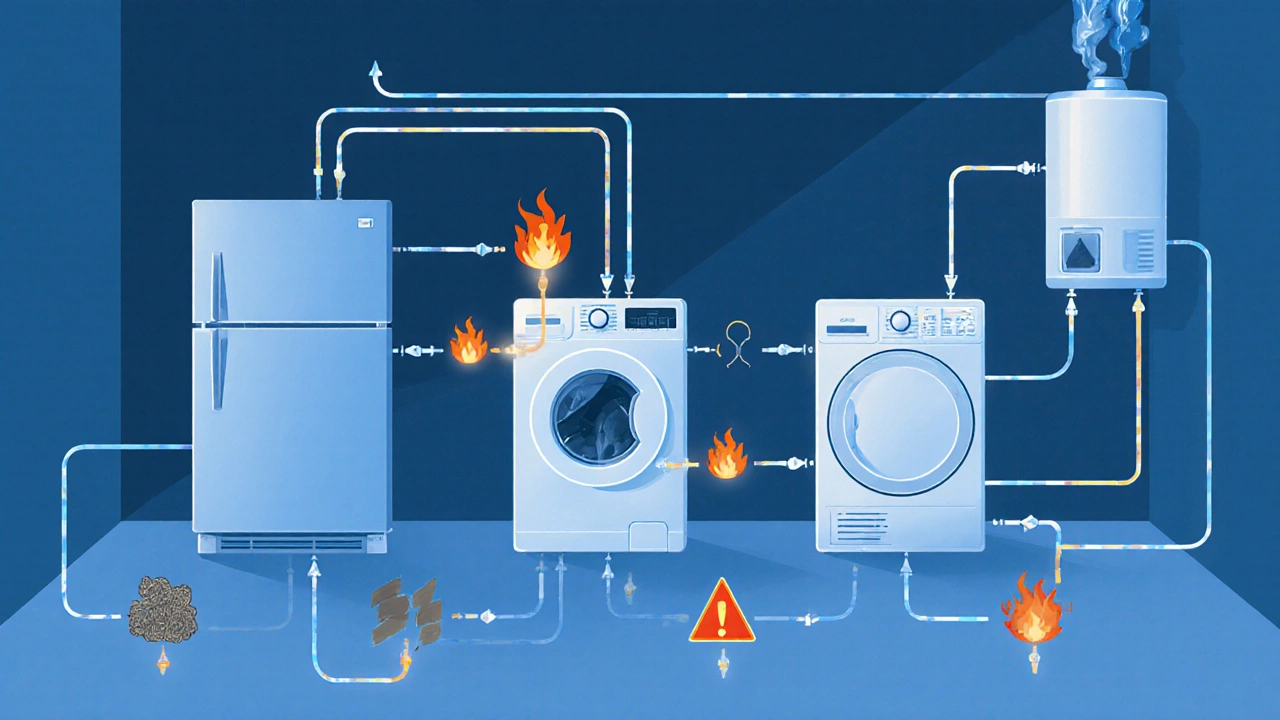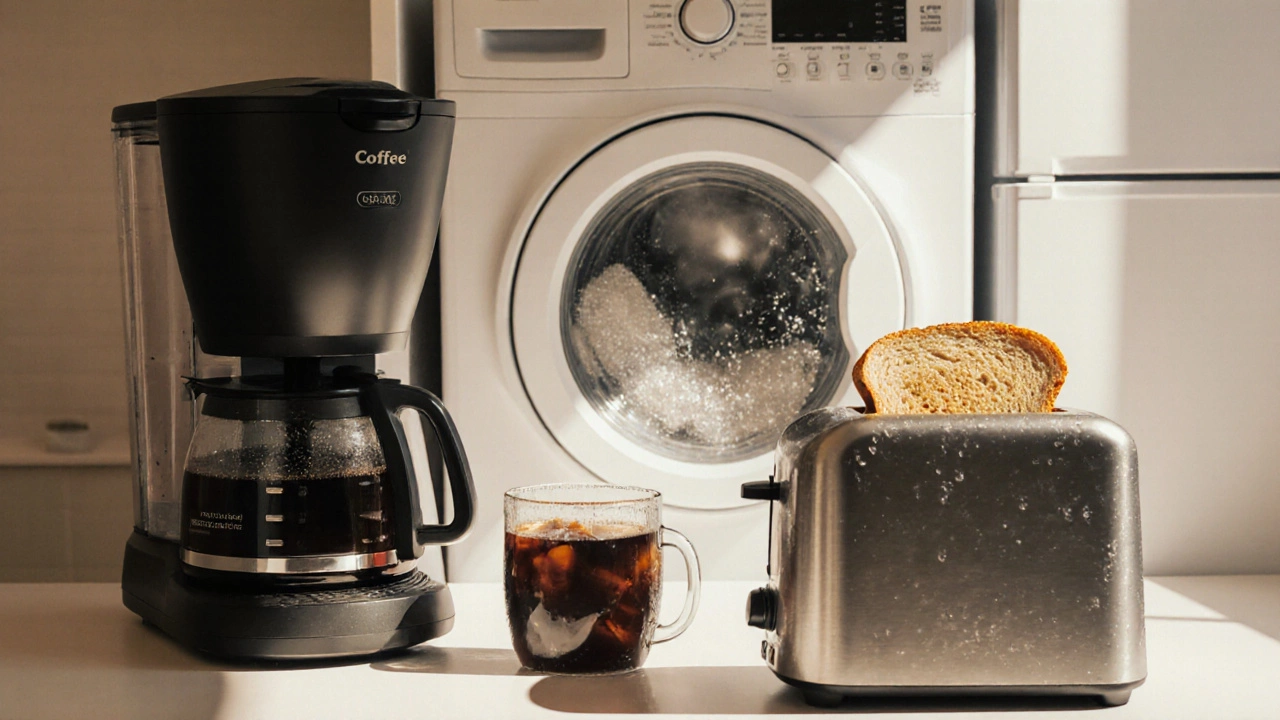Appliance Repair vs Replacement Calculator
Calculate Your Best Option
Answer these questions to see whether repairing or replacing your appliance makes the most sense.
Think about your morning. You wake up, head to the kitchen, and flip the switch on the coffee maker. The toaster pops up your bread. You grab a yogurt from the fridge. You throw your clothes in the washing machine before heading out. None of these things feel like magic - but they’re not simple either. They’re appliances, and they do a lot more than you probably realize.
Appliances Keep Your Home Running Smoothly
At their core, appliances are machines built to make daily tasks easier, faster, or safer. They take manual labor and turn it into something automatic. A fridge doesn’t just keep food cold - it maintains a precise temperature range (usually between 0°C and 5°C) to slow bacterial growth and keep milk, meat, and veggies fresh for days. Without it, you’d be shopping every other day, or worse, risking food poisoning.
Washing machines don’t just swirl water around. They use sensors to detect load size, adjust water levels, and control spin speeds to reduce wear on fabrics. Modern models even have steam cycles that kill 99% of common household bacteria - something you can’t do by hand.
Even small appliances like kettles or toasters have built-in safety features. A kettle shuts off automatically when the water boils. A toaster stops heating once the timer runs out. These aren’t random quirks - they’re engineered responses designed to prevent fires, burns, or electrical damage.
Appliances Save Time and Energy
Before appliances, households spent hours every week on chores. Washing clothes by hand could take half a day. Chopping ice to keep food cold was common in the 1800s. Cooking meant tending a fire for hours. Today, an energy-efficient fridge uses less power than a lightbulb over 24 hours. A modern dishwasher cleans a full load using as little as 10 liters of water - less than you’d use washing the same dishes by hand.
That time savings adds up. The average household spends about 12 hours a week on chores. With appliances, that drops to under 5. That’s nearly 350 hours a year you can spend with family, working, or resting. That’s not just convenience - it’s a lifestyle upgrade.
Appliances Are Connected to Your Health and Safety
Some appliances directly protect your health. An extractor fan in the kitchen removes grease, smoke, and moisture that can lead to mold. Mold spores trigger asthma and allergies - especially in damp climates like Dunedin. A properly functioning extractor fan reduces humidity by up to 80% in under 15 minutes.
Water heaters keep your showers at safe temperatures. If your water heater fails or malfunctions, you risk scalding - water above 50°C can burn skin in seconds. Most modern units have thermostats set to 55°C, with anti-scald valves built in. That’s not a luxury - it’s a safety standard.
Gas cooktops and ovens need regular checks. A small gas leak can fill a room with methane, which is odorless and explosive. Appliance service technicians test for leaks, clean burners, and ensure proper ventilation. Skipping these checks isn’t just risky - it’s dangerous.

Why Appliances Break - And What Happens When They Do
Appliances aren’t indestructible. They’re made of motors, wiring, sensors, and moving parts - all of which wear out. A fridge compressor can last 10-15 years. A washing machine drum bearing might fail after 7. A microwave magnetron can burn out in 5 years if you run it empty too often.
When they break, the impact isn’t just inconvenience. A broken fridge means spoiled food - and potentially hundreds of dollars in losses. A faulty dishwasher can flood your kitchen. A broken boiler in winter? That’s not just cold - it’s a health risk.
Most people wait too long to get repairs done. They think, “It’s still working - sort of.” But a fridge that runs louder than usual? That’s the compressor straining. A washing machine that vibrates violently? That’s an unbalanced drum or worn suspension. These aren’t signs of aging - they’re early warnings. Fix them early, and you save money. Ignore them, and you replace the whole thing.
Appliance Service Isn’t Just Fixing - It’s Preventing
Good appliance service isn’t about waiting for disaster. It’s about keeping things running. A technician will clean the condenser coils on your fridge, check the door seals, test the thermostat, and vacuum dust from the back. That simple service can extend the life of your fridge by 3-5 years.
Same with ovens. Grease buildup on heating elements causes uneven cooking and increases fire risk. A quick clean and calibration can make your oven cook evenly again - no need to replace it.
Many people don’t realize that appliance service includes calibration. A gas hob that doesn’t ignite properly? It might need a new thermocouple. A dryer that takes three cycles to dry clothes? The vent might be clogged. These aren’t big repairs - they’re quick fixes that cost less than $100 but prevent bigger bills later.

What to Look for in Appliance Service
Not all service providers are the same. Look for these signs of quality:
- They use original manufacturer parts - not cheap knock-offs that fail in 6 months.
- They offer a warranty on repairs - at least 90 days.
- They test for safety issues, not just functionality. Gas leaks, electrical faults, and grounding problems matter.
- They explain what went wrong in plain language. If they use jargon like “thermal fuse” without explaining it, walk away.
- They show up on time and clean up after themselves.
Appliance service isn’t a luxury - it’s maintenance, like changing your car’s oil. Skip it, and you pay more later.
When to Repair - And When to Replace
There’s a simple rule: if the repair costs more than half the price of a new appliance, it’s usually better to replace it. But that’s not the whole story.
For example, a $700 fridge with a $350 compressor repair? That’s a bad deal. But if that same fridge is energy-efficient, quiet, and still under warranty? It might be worth fixing. Newer models use 40% less power than those from 10 years ago. If your fridge is older than 10 years, replacing it could save you $100-$200 a year on electricity.
Washing machines? If the drum is cracked or the motor is noisy, replacement is almost always better. The repair cost is often close to a new entry-level model. But if it’s just a faulty door lock? That’s a $60 fix.
Always check for rebates. In New Zealand, the government offers energy efficiency incentives for replacing old fridges, washing machines, and heat pumps. You might get $150-$300 off a new unit.
Appliances Are Part of Your Home’s System
They don’t work in isolation. Your fridge needs good airflow around it. Your dryer needs a clear vent to the outside. Your water heater needs regular flushing to remove sediment. If you ignore one, it affects others.
A clogged dryer vent makes your dryer work harder - which heats up your laundry room and increases fire risk. A fridge that’s too close to the oven? It has to work twice as hard to stay cold. These are hidden connections most people never think about.
That’s why appliance service isn’t just about fixing broken things. It’s about understanding how your home’s systems interact. A good technician doesn’t just fix your dishwasher - they check the water pressure, the drain line, and even the kitchen’s ventilation.
Appliances are the quiet backbone of modern living. They don’t make headlines. But when they stop working, you feel it - in your wallet, your time, and your peace of mind.
What do appliances do in a home?
Appliances automate everyday tasks like cooking, cleaning, cooling, and heating. They save time, reduce physical effort, improve safety, and help maintain hygiene. For example, a fridge preserves food, a washing machine cleans clothes, and an extractor fan removes moisture and odors to prevent mold.
Why do appliances break down?
Appliances break due to wear and tear on moving parts, electrical failures, buildup of dirt or grease, or improper use. A fridge compressor can fail from overheating, a washing machine drum bearing wears out from constant spinning, and a dishwasher pump clogs from food debris. Regular maintenance helps prevent most of these issues.
How often should appliances be serviced?
Most appliances benefit from a check-up every 1-2 years. Fridges and freezers should have their coils cleaned annually. Washing machines need drum and filter checks. Gas appliances like ovens and cooktops require safety inspections yearly. Regular service catches small problems before they become expensive repairs.
Is it cheaper to repair or replace an appliance?
If the repair costs more than half the price of a new appliance, replacement is usually the better choice. But also consider age - if the appliance is over 10 years old, it’s likely inefficient and due for an upgrade. Newer models use less energy and often come with rebates, making replacement cost-effective long-term.
Can I fix appliances myself?
Simple tasks like cleaning filters, unclogging drains, or replacing door seals are safe for homeowners. But anything involving gas, electricity, or internal components - like compressors, motors, or control boards - should be handled by a licensed technician. DIY repairs on these can be dangerous and may void your warranty.
If your appliances are running slower, louder, or less efficiently, don’t ignore it. A small fix today can save you hundreds - and stress - tomorrow.
